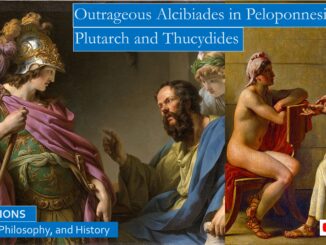
Comeback of Alcibiades in Peloponnesian War, according to Plutarch, Thucydides, and Xenophon
Thucydides quotes the comic playwrights who say that regarding Alcibiades, the Athenians Love Him, Hate Him, and Can’t Do Without Him. During the war, he first advises the Athenians, then the Spartans, then the Persians, then he advises and leads the Athenians again, and everyone who takes his advice is successful in the war, but he manages to irritate so many Greeks and, after the war ends, is eventually slain by the Persians and Spartans. […]



